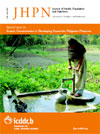
|
The Journal of Health, Population and Nutrition
icddr,b
ISSN: 1606-0997
EISSN: 1606-0997
Vol. 32, No. 2, 2014, pp. 335-341
|
 Bioline Code: hn14036
Bioline Code: hn14036
Full paper language: English
Document type: Research Article
Document available free of charge
|
|
|
The Journal of Health, Population and Nutrition, Vol. 32, No. 2, 2014, pp. 335-341
| en |
Psychosocial Correlates of Dietary Behaviour in Type 2 Diabetic Women, Using a Behaviour Change Theory
Didarloo, A.; Shojaeizadeh, D.; Gharaaghaji asl, R.; Niknami, S. & Khorami, A.
Abstract
The study evaluated the efficacy of the Theory of Reasoned Action (TRA), along with self-efficacy to
predict dietary behaviour in a group of Iranian women with type 2 diabetes. A sample of 352 diabetic
women referred to Khoy Diabetes Clinic, Iran, were selected and given a self-administered survey to
assess eating behaviour, using the extended TRA constructs. Bivariate correlations and Enter regression
analyses of the extended TRA model were performed with SPSS software. Overall, the proposed model explained
31.6% of variance of behavioural intention and 21.5% of variance of dietary behaviour. Among
the model constructs, self-efficacy was the strongest predictor of intentions and dietary practice. In addition
to the model variables, visit intervals of patients and source of obtaining information about diabetes
from sociodemographic factors were also associated with dietary behaviours of the diabetics. This
research has highlighted the relative importance of the extended TRA constructs upon behavioural intention
and subsequent behaviour. Therefore, use of the present research model in designing educational
interventions to increase adherence to dietary behaviours among diabetic patients was recommended
and emphasized.
Keywords
Diabetic women; Dietary behaviour; Self-efficacy; Theory of Reasoned Action; Iran
|
| |
© Copyright 2014 - The Journal of Health, Population and Nutrition
Alternative site location: http://www.jhpn.net
|
|
